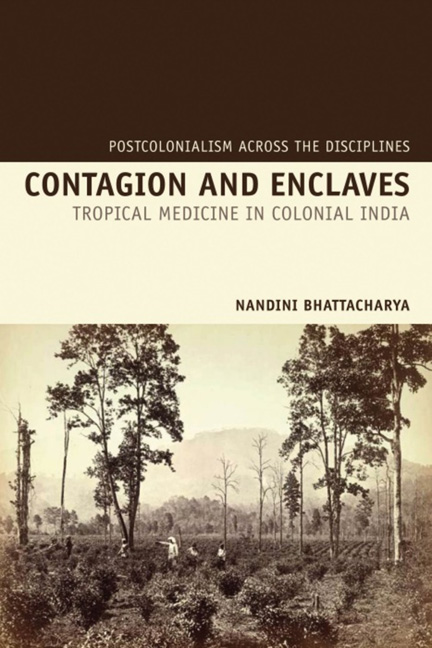Book contents
- Frontmatter
- Dedication
- Contents
- List of Illustrations
- List of Tables
- Acknowledgements
- List of Abbreviations
- 1 Disease and Colonial Enclaves
- 2 The Sanatorium of Darjeeling: European Health in a Tropical Enclave
- 3 Pioneering Years in Plantation and Medicine in Darjeeling, Terai and Duars
- 4 The Sanatorium Enclave: Climate and Class in Colonial Darjeeling
- 5 Contending Visions of Health Care in the Plantation Enclaves
- 6 The Plantation Enclave, the Colonial State and Labour Health Care
- 7 Tropical Medicine in Its ‘Field’: Malaria, Hookworm and the Rhetoric of the ‘Local’
- 8 Habitation and Health in Colonial Enclaves: The Hill-station and the Tea Plantations
- Bibliography
- Index
1 - Disease and Colonial Enclaves
- Frontmatter
- Dedication
- Contents
- List of Illustrations
- List of Tables
- Acknowledgements
- List of Abbreviations
- 1 Disease and Colonial Enclaves
- 2 The Sanatorium of Darjeeling: European Health in a Tropical Enclave
- 3 Pioneering Years in Plantation and Medicine in Darjeeling, Terai and Duars
- 4 The Sanatorium Enclave: Climate and Class in Colonial Darjeeling
- 5 Contending Visions of Health Care in the Plantation Enclaves
- 6 The Plantation Enclave, the Colonial State and Labour Health Care
- 7 Tropical Medicine in Its ‘Field’: Malaria, Hookworm and the Rhetoric of the ‘Local’
- 8 Habitation and Health in Colonial Enclaves: The Hill-station and the Tea Plantations
- Bibliography
- Index
Summary
This book is about the interaction between Tropical Medicine, the colonial state and colonial enclaves. The epistemologies and therapeutics of Western science and medicine informed the practices of colonialism in the tropical world from the eighteenth to the twentieth century. The European conquest and colonization of the non-European world was imbued with the dread of ‘tropical diseases’ and simultaneously sustained by the practices of settlement in these tropical colonies. In analysing these two processes together, this book investigates the links between Tropical Medicine and colonial enclaves.
The perception of the ‘tropics’ itself changed from the abundant and the paradisiacal in the sixteenth century to dark, dank territories that generated ‘putrefaction’, disease and death by the mid-eighteenth century. In eighteenth-century European writing, the status of the Indian subcontinent as a distinctively tropical zone was ambivalent due to its vastness and diversity and the prevalence of different ‘climatic zones’ within. This gradual transformation in the idea of the tropics was the consequence of prolonged European interaction with, and experience of, the tropics. Along with these ideas and experiences of the tropics, from the eighteenth century, European traders, sailors and armies built their own commercial, military and social spaces in the tropics. In the Indian subcontinent, initially these were factories (in their eighteenth-century sense factories were European warehouses), fortresses, churches, barracks and white towns that were located near ports and harbours. Through the eighteenth and the nineteenth centuries, as European commercial and revenue interests after territorial expansion became more intensive, the establishment and maintenance of enclaves within colonial society became vital. These European enclaves within tropical colonies served various purposes: as cantonments for the army, plantations for large-scale capitalist cultivation of cash crops with resident planters and labourers; as hill-stations for British civilian and official residence during the summer, and as exclusive ‘civil lines’ within larger, densely populated towns and cities. Colonialism in modern India was marked by the relationship between the enclaves and the tropical world beyond; these enclaves, therefore, were permeated with the movement of labourers, commodities, soldiers, prostitutes, markets and traders as well as pathogens. This book traces the history of the colonization of the Darjeeling hills in north Bengal as one of the inter-relationships between colonial enclaves and the tropical world; a relationship that, from the late nineteenth century, was imbued with the optimism and momentum provided by Tropical Medicine.
- Type
- Chapter
- Information
- Contagion and EnclavesTropical Medicine in Colonial India, pp. 1 - 17Publisher: Liverpool University PressPrint publication year: 2012



